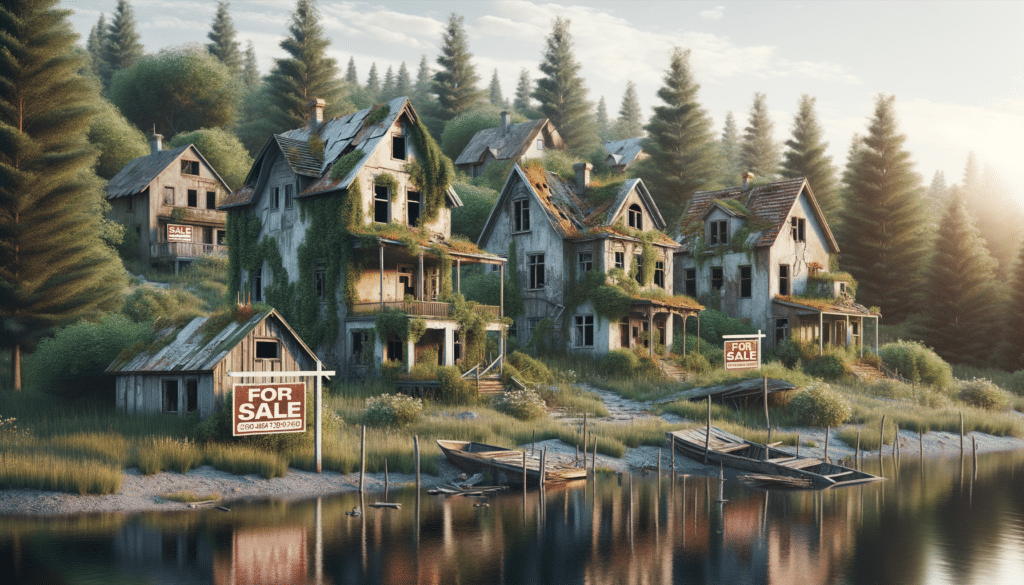Understanding the Market for Abandoned Houses
The real estate market for abandoned houses is as intriguing as it is complex. These properties, often left to the elements, can be found in various states of disrepair. Understanding this market requires a keen eye for potential and a willingness to embrace the unknown. Abandoned houses are typically sold at lower prices, making them appealing to investors and first-time buyers looking for affordable options. However, the lower price point often comes with its own set of challenges, such as extensive renovations and legal hurdles.
One of the key factors driving interest in abandoned houses is their potential for significant return on investment. With the right renovations, these properties can be transformed into desirable homes or profitable rental units. Additionally, the charm of restoring a piece of history can be a compelling aspect for buyers. However, it’s crucial to conduct thorough research before purchasing, as the costs of renovation and legal issues can quickly add up.
Key considerations when exploring this market include:
- Location: The property’s location can significantly impact its value and potential for appreciation.
- Legal Issues: Ensure there are no outstanding liens or legal disputes associated with the property.
- Renovation Costs: Assess the extent of repairs needed and budget accordingly.
Legal and Financial Considerations
Purchasing an abandoned house is not without its legal and financial considerations. Buyers must be prepared to navigate a myriad of legalities, including clearing any existing liens, ensuring property taxes are up to date, and confirming clear ownership. These steps are essential to avoid future disputes or unexpected expenses.
Financing an abandoned property can also present challenges. Traditional lenders may be hesitant to provide loans for properties in poor condition, necessitating alternative financing options such as hard money loans or personal savings. It’s important to have a clear financial plan in place, accounting for both the purchase price and the anticipated renovation costs.
Understanding zoning laws and local regulations is also crucial, as these can affect renovation plans and the property’s intended use. Engaging with a knowledgeable real estate attorney can provide valuable guidance throughout the purchasing process.
Renovation and Restoration: Breathing New Life into Old Structures
Renovating an abandoned house is a journey that requires vision, patience, and a strategic approach. The restoration process can range from minor cosmetic updates to major structural overhauls, depending on the property’s condition. A successful renovation not only enhances the property’s aesthetic appeal but also increases its market value.
Engaging with experienced contractors and architects can make a significant difference in the quality and efficiency of the renovation process. It’s essential to prioritize structural repairs, such as roofing, plumbing, and electrical systems, before focusing on cosmetic enhancements like paint and landscaping.
Creative design choices can also play a pivotal role in maximizing the property’s potential. Incorporating modern amenities while preserving historical features can create a unique and appealing living space that attracts buyers or tenants.
The Emotional and Historical Appeal of Abandoned Houses
Beyond their financial potential, abandoned houses often carry a rich tapestry of history and emotion. For some, the allure lies in uncovering the stories embedded within the walls of these forgotten homes. Each property has its unique narrative, offering a glimpse into the past and an opportunity to preserve a piece of history.
Restoring an abandoned house can be a deeply rewarding experience, allowing individuals to contribute to the revitalization of a neighborhood or community. The process of bringing a home back to life can foster a sense of connection and accomplishment, as well as an appreciation for the craftsmanship of bygone eras.
For those with a passion for history and architecture, abandoned houses offer a canvas for creativity and preservation, blending the past with the present in a meaningful way.
Conclusion: Weighing the Risks and Rewards
Abandoned houses for sale present a unique blend of challenges and opportunities. While they may require significant investment in terms of time, money, and effort, the potential rewards can be substantial. These properties offer a chance to create something new from the old, to weave modern living into historical contexts, and to invest in communities by revitalizing neglected spaces.
Prospective buyers should approach the process with diligence and a clear understanding of the risks involved, ensuring they are prepared for the complexities of renovation and legalities. With the right approach, abandoned houses can transform from forgotten relics into thriving homes, offering both financial and personal fulfillment.





